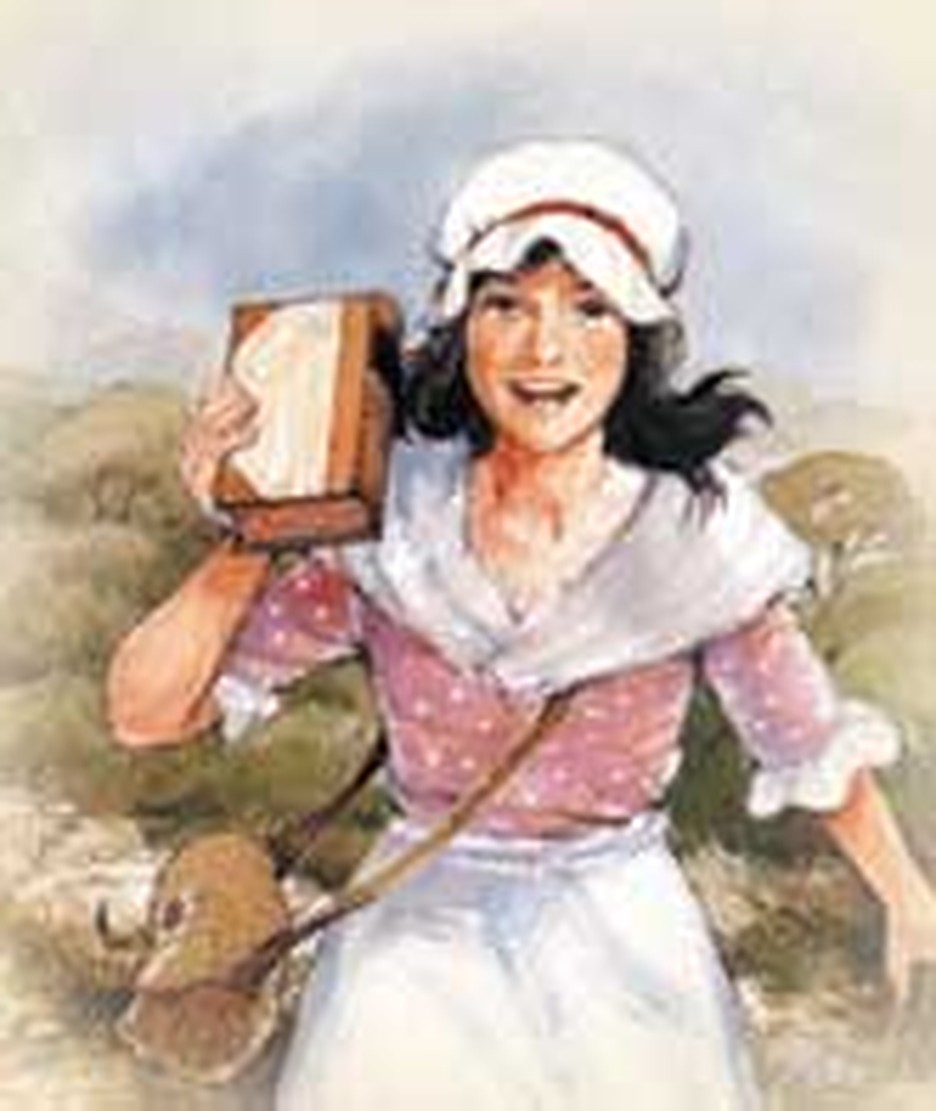
It was dark when Mary and her mother were walking home from the meeting. As they carefully kept to the path in the darkness, Mary recalled the preacher's words from Psalm 119, "God's Word is a lamp to my feet and a light unto my path." How Mary wished she had a Bible of her own so that she could learn more of God's Word!
Mary Jones was born December 16, 1784 in the Welsh village of Llanfihangely Pennant, at the foot of Wales' famous Cedar Idris. Her father had been a weaver, but he died when Mary was four. Mary and her mother were poor, but they got on as best they could.
Long Walk to School
When Mary was about eight, a school was established about an hour's walk
from Llanfihangel. Mary took the two hour round-trip walk each day and
progressed well in reading. She wished she had a Bible to read, but her
mother told her it was too expensive.
A neighbor did have a Bible though, and every Saturday afternoon Mary went to read Mrs. Evans' Bible for several hours. Mrs. Evans was not poor like the Joneses, and she lived in a house filled with beautiful things. Mary, however, was not distracted by the comfort and riches around her. She read through book after book of the Bible.
First, Chickens and Eggs
One day as Mary was doing her chores, washing her family's clothes in
the river, she got the idea that she could earn some money by washing
for other people to save enough money for a Bible of her own. When Mrs.
Evans heard of Mary's plan, she gave Mary some chickens to raise. When
the chicks became hens, Mary could earn money by selling the eggs. Mary
soon found other ways for earning money too -- looking after children,
weeding gardens, knitting socks.
After six years of careful saving, Mary finally had enough money to buy a Bible. But there was none to be bought in her village. Reverend Thomas Charles sold them in Bala, though. But that was over twenty-five miles away! In the summer of 1800, when not yet sixteen, Mary set out alone with the money she had earned on the long walk to Bala. She even took off her shoes and carried them so they wouldn't wear out. Although a long and difficult walk, it really didn't hurt that much as Mary was so full of anticipation.
Too Late, Mary
When she finally arrived and found Rev. Charles, he told her he only had
one Bible left and it had already been promised to someone else. Mary
could not hold back the tears. After working and saving for six years,
then walking over twenty-five miles, Mary could not help but be extremely
disappointed. All her work seemed wasted! But when Rev. Charles heard
Mary had worked six years to buy a Bible, he made her take his last one.
The other person could wait a little longer.
Mary Sparks a Vision
Rev. Charles was tremendously moved by Mary's efforts to obtain a Bible.
Many people in Wales and throughout Britain were coming to Christ; Bibles
should be more readily available for these new converts. In December 1802,
Rev. Charles was in London and laid before a committee of the Religious
Tract Society the desperate need for Bibles in the Welsh language. Rev.
Charles told the committee about Mary Jones and all she had to do in order
to get a Bible of her own. Though the committee appreciated the need for
Bible distribution, neither the Religious Tract Society nor the Society
for the Promotion of Christian Knowledge felt they could meet the demand.
Rev. Joseph Hughes suggested that "a society might be formed for
the purpose -- and if for Wales, why not for the Kingdom; why not for
the whole world?"
Getting the Word Out
Fifteen months later, on March 7, 1804, the British and Foreign Bible
Society was formed "for the wider distribution of the Scriptures,
without note or comment." The Clapham Sect, a group of influential
evangelicals including William Wilberforce, were important in establishing
the BFBS. The BFBS was concerned with distributing Bibles throughout the
whole world, and within a few months the Gospel of John was issued in
the Mohawk language. The Society was not interested in fostering any particular
interpretation of the Bible; it was solely concerned with people having
access to the Scripture. The governing committee was interdenominational
and included fifteen Anglicans, fifteen Free Church laymen, and six representatives
of foreign churches.
To All the World
Auxiliary local groups arose throughout Britain to raise funds and distribute
Bibles in their localities. Similar Bible societies were formed in Germany,
the Netherlands, Denmark, Russia, France, Greece and the USA The Bible
Societies worked closely with the growing missionary endeavors to bring
the Bible in other languages. All of the great missionaries, including
William Carey in India, Robert Morris in China, Henry Martyn in India,
and Adoniram Judson in Burma, relied on the Bible Societies for support.
By 1907, the BFBS had distributed 203,931,768 Bibles, Testaments and portions
of Scripture throughout the world. This worldwide movement of Bible translation
affected men and women of many nationalities and church traditions, but
in its inception, it grew out of local needs, such as those of little
Mary Jones.
Mary died at the age of 82. In the town of Llanfihangel, a monument has been erected with the following inscription in English and Welsh: To the remembrance of Mary Jones, who in 1800 at the age of 16, walked from here to Bala, in order to buy a Bible from Rev. Charles in the Welsh language. This event was the cause of the foundation of the British and Foreign Bible Society.
What happened to the Bible? |



.jpg)